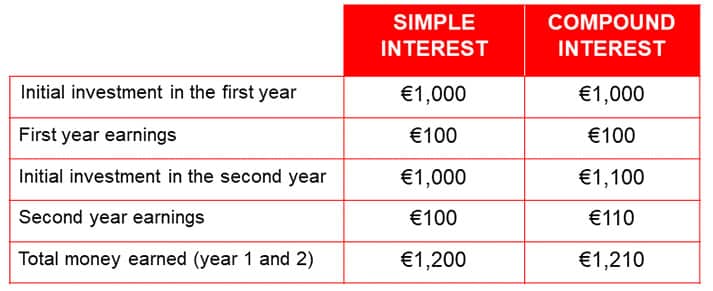The snowball effect of compound interest: what it is and how it benefits you

Redacción Mapfre
Inflation seems to be giving savers a break, although it’s still far from pre-pandemic levels, when it didn’t even manage to reach the 2% target level set by central banks. In this context, it’s vital for savers to invest their money in products that allow them to obtain a return so that they can maintain their purchasing power.
Choosing the most appropriate investment for each investor's profile is vital to ensure that they feel comfortable, but there are also ways to enhance those savings. And one of the best examples is compound interest: like a snowball, it makes your savings grow little by little over time.
What is simple interest and compound interest?
Simple interest is the return on any investment product. For example, if you invest 100 euros and the interest rate is 3% per month, you would earn three euros in one month. So your capital would amount to 103 euros. This is where compound interest comes into play.
Technically, it’s the “return on capital when the accumulated interest is added to the initial principal,” as explained by Fundación MAPFRE in its MAPFRE Insurance Dictionary. In other words, it consists of reinvesting the profits generated by the initial investment rather than withdrawing them.
Compound interest makes profits grow exponentially and, at the same rate, increases the initial capital invested due to the interest yielded by the transaction itself. In addition, it works in all types of savings and/or investment products that allow for compounding of earnings and a fixed interest rate over time. If the variables change, profit ceases to be exponential.

According to the Nobel Prize winner for Physics Albert Einstein, “compound interest is the eighth wonder of the world.” However, Daniel Sancho, Head of Investment at MAPFRE Gestión Patrimonial, explains that it’s fundamentally based on “being methodological and faithful to your plan, and having a lot of patience.” “Compound interest only works for investors and savers who have a good understanding of the long term,” he stresses.
Keys to taking advantage of compound interest
The importance of working with experts
Just as we rely on experts when it comes to our health or legal problems, we need to do the same when it comes to our finances. Financial advisors help you meet your goals while keeping your needs in mind.
At MAPFRE, we have MAPFRE Gestión Patrimonial, our advisory area, where we work hard to explain to each customer what the current economic situation is and what strategy to take.


